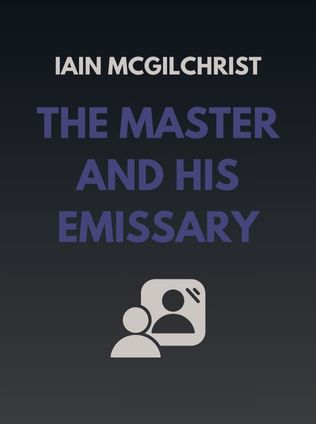
The Master and His Emissary
The Divided Brain and the Making of the Western World
By Iain McGilchrist
Published 10/2009
About the Author
Iain McGilchrist, a psychiatrist, philosopher, and literary scholar, has established himself as a prominent thinker on the relationship between the brain's two hemispheres and their influence on culture and history. Educated at Oxford, where he studied English literature, McGilchrist later transitioned into medicine, specializing in psychiatry. His unique interdisciplinary approach—combining neuroscience, philosophy, literature, and art—allows him to explore complex ideas with both depth and breadth. McGilchrist's career reflects his belief in the integration of diverse fields of knowledge, much like the interplay he describes between the brain's hemispheres.
His most acclaimed work, The Master and His Emissary, reflects this synthesis of disciplines. It challenges the widely held notion that the left hemisphere is dominant and superior, a belief perpetuated by the popularization of brain research. Instead, McGilchrist presents a compelling argument for the dominance of the right hemisphere in grounding our most fundamental human experiences, from our capacity for empathy to our understanding of meaning and context. His insights are drawn from his extensive study of literature, philosophy, and neuroscience, making his book a rich, multifaceted exploration of the human mind and culture.
McGilchrist's background as both a literary scholar and a medical professional gives him a unique perspective. His ability to draw on a wide range of sources, from ancient Greek philosophy to modern neuroscience, allows him to craft a narrative that is both deeply informed and accessible. His work is not just an academic exercise but a passionate plea for a more balanced approach to understanding the human mind and its relationship to the world.
Main Idea
In The Master and His Emissary, McGilchrist argues that the brain's hemispheres, while physically connected and cooperative, have distinct roles that shape our experience of reality. He suggests that the right hemisphere, which he terms "The Master," is crucial for our understanding of the world, as it grasps the implicit, contextual, and holistic aspects of reality. In contrast, the left hemisphere, or "The Emissary," focuses on the explicit, the abstract, and the analytical. McGilchrist contends that the modern world, particularly in the West, has come to overly prioritize the left hemisphere's way of thinking, leading to a fragmented and impoverished experience of life. This imbalance, he argues, is evident in various historical periods and is particularly pronounced in contemporary culture.
The book's title itself is a powerful metaphor. The "Master" is the right hemisphere, responsible for guiding us through the complexity of life with a broad, contextual understanding. The "Emissary," the left hemisphere, is tasked with executing specific tasks, such as analyzing and categorizing. However, in McGilchrist's view, the Emissary has taken over, attempting to usurp the Master, leading to a world where the richness of experience is diminished, and life is increasingly viewed through a narrow, utilitarian lens.
Table of Contents
- Introduction
- The Divided Brain
- The Master and His Emissary: The Right Hemisphere and the Left Hemisphere
- The Divided World: Culture and the Brain
- The Return of the Right Hemisphere
- Conclusion: The Way Forward
1. Introduction
The introduction of The Master and His Emissary sets the stage for McGilchrist's exploration of the brain's hemispheres. He critiques the oversimplified view of the brain that dominates popular culture, which often depicts the left hemisphere as the seat of rationality and the right hemisphere as a minor player responsible for creativity and emotion. McGilchrist argues that this dichotomy is not only inaccurate but also dangerous, as it ignores the vital role the right hemisphere plays in grounding our experience of reality. He introduces the central metaphor of the book: the right hemisphere as the "Master" who understands the whole picture, and the left hemisphere as the "Emissary" who, in seeking to dominate, threatens to undermine the Master's authority.
McGilchrist's exploration begins with a critique of the reductionist view of the brain that has become prevalent in both academic circles and popular culture. This view, which often emphasizes the left hemisphere's role in logical reasoning and language, overlooks the complex interplay between the two hemispheres. McGilchrist argues that this reductionism is not only scientifically inaccurate but also has profound implications for how we understand ourselves and our world. By privileging the left hemisphere's functions, we risk losing sight of the richness and depth that the right hemisphere brings to our experience of reality.
In his introduction, McGilchrist sets the tone for a book that is not just an academic treatise but a call to re-evaluate how we think about the brain and its influence on culture. He challenges the reader to consider the possibility that our current way of thinking, dominated by the left hemisphere, is leading us down a path of increasing alienation and fragmentation. The introduction lays the groundwork for a journey through history, neuroscience, and philosophy, as McGilchrist seeks to uncover the roots of this imbalance and explore the consequences for our society.
Sign up for FREE and get access to 1,400+ books summaries.
You May Also Like
The Subtle Art of Not Giving a F*ck
A Counterintuitive Approach to Living a Good Life
By Mark MansonHow To Win Friends and Influence People
The All-Time Classic Manual Of People Skills
By Dale CarnegieFreakonomics
A Rogue Economist Explores the Hidden Side of Everything
By Steven D. Levitt and Stephen J. Dubner



















